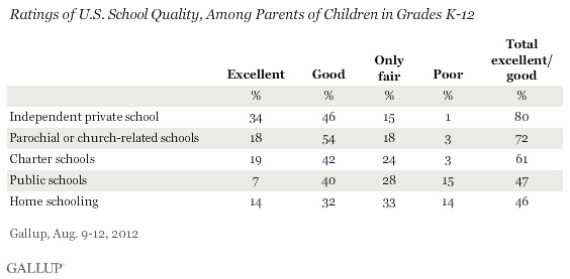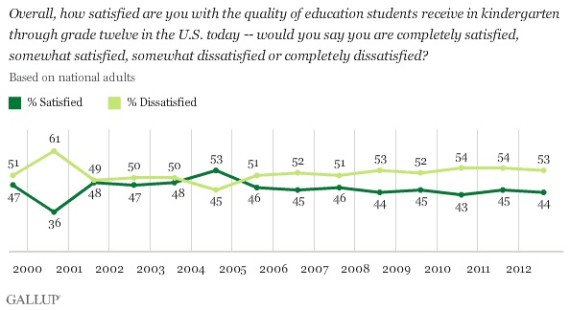
More than half of Americans are dissatisfied with American public education, but are more inclined to rate their own children’s schools highly, according to a recent Gallup survey.
The results of Gallup’s annual Work and Education poll, which surveyed 1,012 adults from Aug. 9-12, suggest that 78 percent of Americans believe children educated in private schools receive an "excellent" or "good" education, which is more than can be said for the four other types of U.S. schooling.
Although 83 percent of parents with children in grades K-12 indicated their oldest child attends public school, only 37 percent of respondents said public schools provided an “excellent” or “good” education. Among parents, 47 percent expressed this level of confidence in public schools, behind private, parochial and charter schools, but ahead of home schooling.

When taking party identification into account, Republicans responded much more positively to home schooling, and, to a lesser degree, parochial schools when compared to Democrats. Democrats, on the other hand, were 13 percentage points more favorable toward public schools compared to their Republican counterparts. That said, Democrats still rated private, parochial and charter schools as providing better education than public schools.
Overall, the poll found that 53 percent of Americans are dissatisfied with the quality of education students receive in the U.S. Gallup reports that only once in the 13-year history of the poll -- in 2004 -- have more Americans been satisfied than dissatisfied.

When asked to rate their own child’s school, however, 75 percent of parents indicated they were positive about their children’s quality of education -- a statistic that also held true for public school parents. According to Gallup, the percentage satisfied with their own children’s education has never dipped lower than 68 percent since 1999.

In comparing the two graphs above, Gallup researchers say the low public school satisfaction among Americans is likely not a commentary on their own child's school -- as they tend to rate those highly. "Rather, Americans may just have a general sense that U.S. public education is not where it needs to be, perhaps due to news media reports that American students lag behind students in other countries in basic academic skills," according to the report.
According to results from a Gallup poll released in June, only 29 percent of respondents expressed a “great deal” or “quite a lot” of confidence in American public schools — a record low.